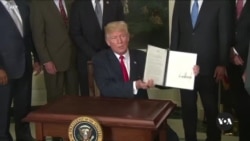Asia braces for higher tariffs under the Trump administration.
Welcome to VOA Asia Weekly. I'm Jessica Stone in Washington. That story is just ahead, but first, making headlines:
Rescuers are searching for more victims in northern Sumatra, Indonesia. Heavy rain over the weekend triggered deadly flooding and landslides - killing more than 15 people. Disaster relief officials say tourists could also be trapped in the landslide.
Hundreds of Congress party supporters protested near Parliament in New Delhi on Monday, demanding the arrest of billionaire Gautam Adani who faces fraud and bribery charges in the U.S. Police detained several demonstrators. Protesters accuse the government of shielding Adani, a close ally of Prime Minister Modi.
Philippine President Ferdinand Marcos says he’ll "fight back" against an active threat by Vice-President Sara Duterte to have him killed. The country’s justice department plans to summon Duterte for an investigation. The two leaders had a bitter falling out over key differences this summer.
Negotiators in Busan South Korea this week are working towards the first-ever global plastics treaty. It’s expected to address how plastics are discarded, but also how much plastic is produced and used. A final agreement is due in December.
"We’ll forever miss our beautiful girl and hope her loss of life has not been in vain.”
The father of an Australian teenager who died of methanol poisoning in Laos wants the government to investigate her death – so it will never happen again. 19-year-old Bianca Jones was rushed to Thailand for treatment after ingesting methanol in an alcoholic drink in Vang Vieng. Laotian police have detained the manager and owner of a hostel where she stayed.
Countries around the world are bracing for economic upheaval as incoming U.S. President Donald Trump threatens massive tariffs, especially on China. The uncertainty has left governments and businesses struggling with how to respond. VOA’s Bill Gallo reports from Seoul.
During his first term, Donald Trump imposed sweeping tariffs on China, shaking the global economy.
Ahead of his return, Trump is vowing even more drastic measures – 10% tariffs on all imports to the U.S. and a staggering 60% on goods from China.
While China hasn’t commented directly on Trump’s threats, it has warned against further trade tensions.
"There’s no winner in a trade war, nor will the world benefit from it."
Any Trump tariffs could especially hurt economies that depend on exports but an expanded U.S.-China trade war could also create opportunities.
Many countries have benefited as production shifts away from China to avoid tariffs. Thailand's commerce minister recently told VOA’s Thai Service his country has seen an influx of U.S. companies relocating factories from China.
“We should be able to weather this. I actually see these problems as benefits for Thailand. I believe that we can be an investment destination for every country.”
Much of the uncertainty stems from Trump’s unpredictability. During his first term, he often used the prospect of tariffs as a bargaining tool, before eventually striking individual trade deals, analyst Jayant Menon says.
“Trump is not a protectionist, I think, right? He’s a dealmaker. That’s what he likes to present himself as – you know, the art of the deal and all that…((white flash cut))...so he likes free trade agreements that he has a role in.”
Menon says countries targeted by Trump could push for new trade agreements, instead of tit-for-tat tariff escalations that could harm themselves and the global economy.
Not all of Trump’s proposals point toward increased protectionism.
He has also suggested rolling back subsidies for U.S.-made electric vehicles – subsidies put in place by the Biden administration.
“He’s already called them silly in a podcast with Joe Rogan. So he’s probably going to roll them back. And that's a positive in terms of the distortions that affect the global economy.”
Both risks and opportunities as the world figures out how to respond to the return of an unpredictable U.S. president.
Bill Gallo, VOA News, Seoul, South Korea.
Visit voanews.com for the most up-to-date stories.
I’m Jessica Stone
Finally, How do you celebrate a Panda-versary? With a bear hug and lots of bamboo!
Hong Kong's locally born twin panda cubs turn 100 days old!
Thousands of people gathered at ocean park to celebrate the cubs’ big day. Early visitors received red eggs and ginger pork knuckles, a Chinese tradition for newborns. The cubs don’t have names yet but are called “elder sister” and “little Brother” in Cantonese.
Thanks for watching VOA Asia Weekly.












